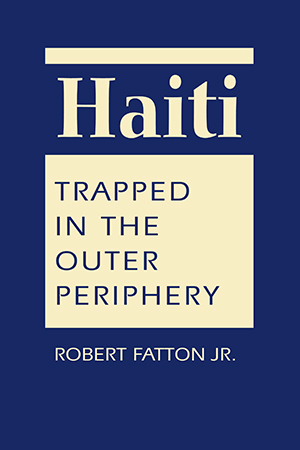Robert Fatton Jr.
The inability of the Haitian state to deal with the devastation of the January 2010 earthquake brought into sharp focus Haiti’s desperate social and economic conditions—and raised perplexing questions. What accounts for the country's continuing predicament? Why have repeated attempts at democratic governance failed so abysmally? And what role has the international community played?
Addressing these questions, Robert Fatton focuses on Haiti's long history of predatory rule and also introduces the concept of the outer periphery to explore the impact of a world economy shaped by neoliberal policies. The result is an insightful analysis of contemporary Haitian politics and society with significant implications for the broader study of comparative politics.
Robert Fatton Jr. is Julia A. Cooper Professor of Government and Foreign Affairs at the University of Virginia. His numerous publications include
Predatory Rule: State and Civil Society in Africa;
Haiti’s Predatory Republic: The Unending Transition to Democracy; and
The Roots of Haitian Despotism. Professor Fatton was awarded the Haitian Studies Association Award for Excellence in 2011.
Also of interest:
Haiti's Predatory Republic and
The Roots of Haitian Despotism both by Robert Fatton Jr and
Tectonic Shifts: Haiti Since the Earthquake by Mark Schuller and Pablo Morales, editors
"Fatton's book is a must-read.... The book's blatant truth and solid analysis disclose the battered Haitian sociopolitical landscape that causes the state to be dysfunctional and extremely vulnerable to varied interests that arrest the autonomous development of the state."—Patrick Sylvain, Journal of Haitian Studies
"Few studies capture the complex array of forces underpinning Haiti's political development as completely or as lucidly as Robert Fatton's most recent monograph.... This is a skillfully crafted book whose arguments merit serious consideration. It is not only an incisive rejoinder to the dominant intellectual discourse about international aid and state failure; it also offers a thought-provoking challenge to policymakers (both Haitian and international) engaged in the reconstruction of Haiti."—Daniel J. Beers, Perspectives on Politics
"Highly recommended."—Choice
"An exceptionally strong and engaging volume.... Fatton not only illuminates key features of Haiti's political structures and historical legacies, but also examines the many and varied forms of outside intervention."—Yasmine Shamsie, Wilfrid Laurier University
"Fatton has definitely put on trial neoliberalism and its devastating impact on Haiti and its people."—Francois Pierre-Louis Jr., Queens College, CUNY






